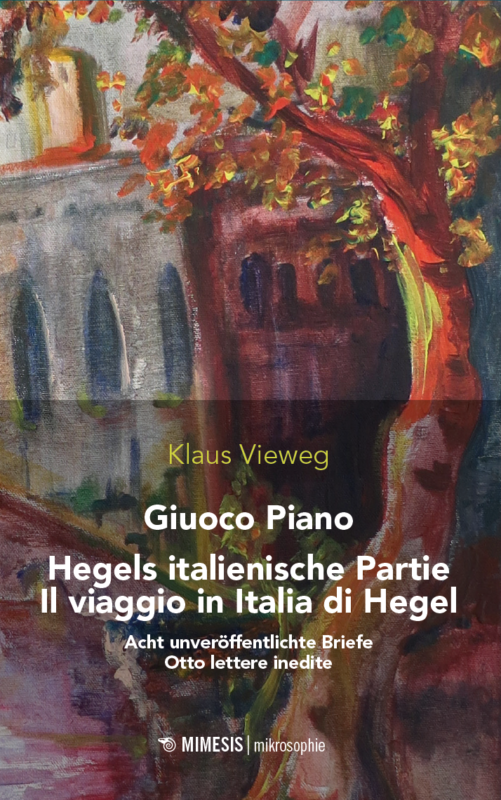We are pleased to announce the release of Giuoco Piano. Hegels italienische Partie. Acht unveröffentlichte Briefe by Klaus Vieweg (Mimesis Verlag / Mimesis Edizioni, 2017). The volume is a bilingual German-Italian book, and the Italian version is translated by Francesca Iannelli.
The book will be presented at the conference “Hegel und Italien – Italien und Hegel: Geistige Synergien von gestern und heute” (Villa Vigoni, 26th-28th October 2017). Further information about the conference could be found at this link.
Below you will find a short abstract of the book (Ger/Ita).
You can also download the PDF version of the cover at this link. For more information about the volume, please visit the publisher’s website.

Giuoco Piano.
Hegels italienische Partie. Acht unveröffentlichte Briefe
Mit dieser literarischen Petitesse werden acht unveröffentlichte Hegelsche Briefe aus Italien vorgestellt. Während der gemeinsamen Zeit in Jena um 1800 entsteht bei Schelling und Hegel die Idee zu einer italienischen Reise. Wegen Schellings Ruf nach Würzburg musste Hegel alleine reisen. Mit acht Briefen aus Neapel und Rom soll augenzwinkernd über Hegels italienische Partie berichtet werden, über Hegels Liebe zu Italien. Die wundersamen Briefe aus der Heimat der von deutschen Idealisten so verehrten und geschätzten Italiener – von Dante, Leonardo, Raffael über Ariost und Macchiavelli bis zu Rossini – sollen auch etwas Schmunzeln auslösen.
Giuoco Piano.
Il viaggio in Italia di Hegel. Otto lettere inedite
Questa petitesse letteraria raccoglie alcune lettere inedite che Hegel scrisse dall’Italia. Durante gli anni trascorsi assieme a Jena, agli inizi del 1800, Schelling e Hegel meditarono più volte di intraprendere un viaggio in Italia, ma in seguito alla chiamata di Schelling all’Università di Würzburg, Hegel dovette mettersi in viaggio da solo. Con otto lettere scritte da Napoli e da Roma si vuole raccontare, appellandosi alla complicità del lettore, la “partita italiana” di Hegel e il suo amore per l’Italia. Questa suggestiva raccolta epistolare – dalla patria di Dante, Leonardo, Raffaello, Ariosto, Machiavelli e Rossini, tanto venerati quanto stimati dagli idealisti tedeschi – riuscirà a stupire il lettore, rallegrandone lo spirito.
Printable Version

